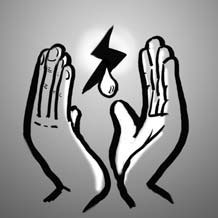 A young woman told a television reporter that she couldn't understand why her mother-in-law insisted on keeping a big pottery vat in the kitchen. A young woman told a television reporter that she couldn't understand why her mother-in-law insisted on keeping a big pottery vat in the kitchen.
There is no need for it any more, when tap water flows into every home of her drought-plagued village in Northwest China's Ningxia Hui Autonomous Region. She and other villagers do not have to trek miles for water as they and their ancestors did before. The elderly woman gave a shy smile. "Every drop of water is still precious," she said. Simple and straightforward, the elderly woman told the truth. Everyone of us should heed it whether we live in urban centers or rural areas, in water-rich river valleys in the south or in the drought-ridden north. Unfortunately, many of us take clean tap water, a symbol of modernization, for granted. We abusively use it as if its supply is endless. It is not. Per capita share of water resources in China is only one-fourth the world's average. Clean water is even scarcer, as its sources are being contaminated. But our abuse of scientific and technological advances, which make our labor productive and our life convenient, comfortable and healthy, is not limited to tap water. Take pesticides and chemical fertilizers. We see on TV how farmers spread these products without any warning that their excessive application could harm their crops and themselves as well. A friend of mine who works in New York complained to me last week that she felt as if she were frozen in her office. The air conditioner kept running despite the fact that the outdoor temperature was hovering around 20-some C. I attended several meetings at the United Nations' headquarters in New York a few years ago. I was aghast at how much paper the UN offices use, even though most documents were available on the Internet. We do make a point of trying to use both sides of the paper at work. However, used paper gets stuck in printers so often that we are advised to use new paper, for fear that the printers may break down. We have always blamed big or small industries as culprits for shortages of natural resources such as water and energy, environmental degradation and global warming. But now we should realize that there is much more we can do to save natural resources, improve energy efficiency, reduce pollution and CO2 impact. Office building managements worldwide should make it a rule to move the air conditioning thermostat up at least to between 24 to 26 C, which is still 2 C lower than what is mandatory in Japan. The manufacturers of laser printers should improve their products so that they can easily print paper on both sides. We as individuals can also contribute. Quite a few of my friends have already started to calculate their greenhouse gas responsibility. They count the kilometers they travel in the airplane, or taxis they take alone. And they think of ways to plant more trees. I've seen my colleagues make their own notebooks using the paper only printed on one side. Some have replaced almost all incandescent light bulbs at home with compact fluorescent bulbs (Cfl). A Cfl uses 60 percent less energy than a regular bulb, thus reducing carbon dioxide emissions. Meanwhile, we should also become more aware in evaluating new scientific and technological gadgets to see if they are first of all green. That elderly rural woman was right: Every drop of water - as well as fossil fuel and electricity - is precious. E-mail: lixing@chinadaily.com.cn (China Daily 06/21/2007 page10)
|

